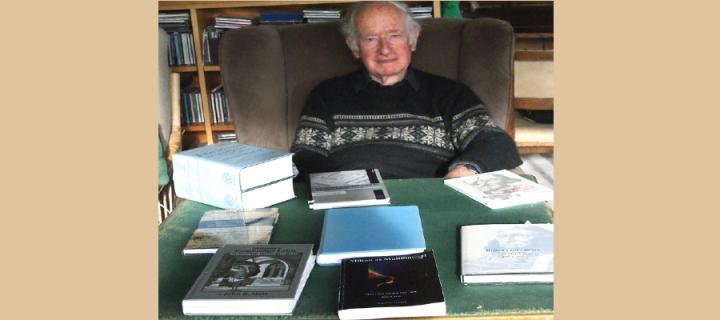John Hale
Renowned Milton scholar Dr John Hale on the research path that took him to Dunedin, New Zealand, and why the author of 'Paradise Lost' is worth disagreeing with.
| Name |
John Hale |
| Degree | Postgraduate Diploma then PhD |
| Year of Graduation | 1966 then 1971 |

At the moment
I’m living in Dunedin, New Zealand. I retired from teaching English at the University of Otago in 2005, and continue research writing; seven books on John Milton to date. I receive the annual “Honoured Scholar” award from the Milton Society of America in Dublin next April. This made me think of telling other Edinburgh alumni.
Your time at the University
I studied Classics at Oxford, and taught it for three years. And English, and enjoyed teaching that more. I chose Edinburgh to equip myself better to teach English Literature (and as it turned out, to research Milton). I was recommended to try its Postgrad Diploma for this purpose, by an Edinburgh PhD student from Sierra Leone.
International friendships continued once I got there, in the glorious days before overseas fees began soaring. In the world’s most beautiful city I hobnobbed with the like-minded from Lesotho, Nigeria, India, Pakistan, Canada, Switzerland, Scotland, and more. Some friendships proved to be lifelong, from Toru Nishimura and Robin Gilmour and to my wife Beatrice from Aberdeen. All of that is what Edinburgh has meant to me. And in my twilight years I am telling my tale here now, in hopes to revive some mislaid friendships.
Your experiences since leaving the University
At first in those years I researched fiction about colonialism, with Paul Edwards. Then I switched to Shakespeare for doctoral study, with Ronnie Mulryne then Harold Jenkins. Next I taught in Manitoba for two years, then in New Zealand from 1971. In the 1980s I changed research subject again, from Shakespeare to Milton.
Now Milton isn’t a general favourite with readers, I know; but he is arresting and worth disagreeing with. That’s in his hard-hitting, opinionated prose. In his verse — his voice in the verse — Milton has no parallel. The sublimity of his “epic voice” takes possession when you read it aloud with other people. (Good to be speaking inspired words for a change, thanks to him!) It transforms your teaching, the sharing of the experience of hearing and performing. As for research, you discover things for yourself as you hurtle along in an all-day “marathon” reading of 'Paradise Lost'.
In the process I saw that, having Greek and Latin from my Oxford BA, and also his other languages, I might put these together and read him in his own multilingual words. I could write a practical criticism, as imbibed in Edinburgh, across the languages of early-modern culture. Indeed, Milton scholarship is more monolingual these days than it should be, seeing that he wrote half his oeuvre in Latin. So I had found my niche at last. Through his multilingualism I can appreciate him and argue with him directly. This is where the last 30 years or so have gone, writing seven books, from 'Milton’s Languages' (Cambridge, 1997) to 'Milton’s Scriptural Theology: Confronting De Doctrina Christiana' (ARC Humanities, 2019).
In his verse — his voice in the verse — Milton has no parallel. The sublimity of his “epic voice” takes possession when you read it aloud with other people.
Life during Covid-19
During Covid-19, I have been publicising my book, looking around for a new topic, writing a million emails, and missing Beatrice, who has been trapped in lockdown in Australia with one of our daughters on a visit. New Zealand handled the pestilence outstandingly, yet not without a few own-goals. It remains doubtful whether I can go to Dublin next April to receive that award. The international jetting-around which research has been presupposing, and which my own life’s doings exemplify, may be over. I hope not.
Alumni wisdom
The problem with advising is knowing when to stop. I’ll just say, Edinburgh (gown and town alike) has been a friendly and generous place for me in my time. May that continue.
Related links
Do you recognise John? He would like to hear from Edinburgh friends he has lost touch with. Please get in touch with him using the contact details on his University of Otago staff page:
John's profile at the University of Otago (external link)
John's latest book, 'Milton’s Scriptural Theology: Confronting De Doctrina Christiana' (external link)

